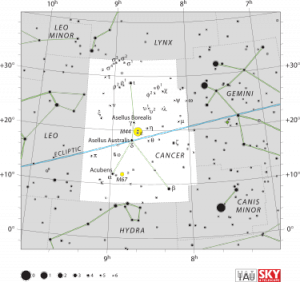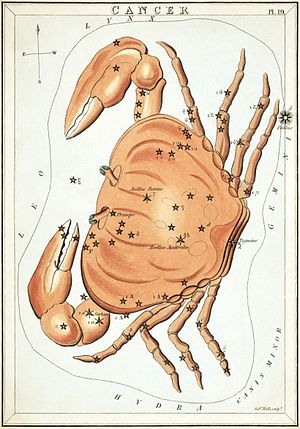Cancer (Constellation): Difference between revisions
No edit summary |
|||
| Line 1: | Line 1: | ||
[[File:375px-Cancer IAU.svg.png|thumb|Cancer]] | [[File:375px-Cancer IAU.svg.png|thumb|Cancer]] | ||
[[Cancer]] is one of the twelve constellations of the zodiac. Its name is Latin for crab and it is commonly represented as one. Its astrological symbol is (Unicode ♋). Cancer is a medium-size constellation with an area of 506 square degrees and its stars are rather faint, its brightest star Beta Cancri having an apparent magnitude of 3.5. It contains two stars with known planets, including 55 Cancri, which has five: one super-earth and four gas giants, one of which is in the habitable zone and as such has expected temperatures similar to Earth. Located at the center of the constellation is Praesepe(Messier 44), one of the closest open clusters to Earth and a popular target for amateur astronomers. | [[Cancer (Constellation)|Cancer]] is one of the twelve constellations of the zodiac. Its name is Latin for crab and it is commonly represented as one. Its astrological symbol is (Unicode ♋). Cancer is a medium-size constellation with an area of 506 square degrees and its stars are rather faint, its brightest star Beta Cancri having an apparent magnitude of 3.5. It contains two stars with known planets, including 55 Cancri, which has five: one super-earth and four gas giants, one of which is in the habitable zone and as such has expected temperatures similar to Earth. Located at the center of the constellation is Praesepe(Messier 44), one of the closest open clusters to Earth and a popular target for amateur astronomers. | ||
Cancer is a medium-sized constellation that is bordered by Gemini to the west, Lynx to the north, Leo Minor to the northeast, Leo to the east, Hydra to the south, and Canis Minor to the southwest. The three-letter abbreviation for the constellation, as adopted by the International Astronomical Union in 1922, is 'Cnc'.[3] The official constellation boundaries, as set by Eugène Delporte in 1930, are defined by a polygon of 10 sides.Cancer is the dimmest of the zodiacal constellations, having only two stars above the fourth magnitude. | Cancer is a medium-sized constellation that is bordered by Gemini to the west, Lynx to the north, Leo Minor to the northeast, Leo to the east, Hydra to the south, and Canis Minor to the southwest. The three-letter abbreviation for the constellation, as adopted by the International Astronomical Union in 1922, is 'Cnc'.[3] The official constellation boundaries, as set by Eugène Delporte in 1930, are defined by a polygon of 10 sides.Cancer is the dimmest of the zodiacal constellations, having only two stars above the fourth magnitude. | ||
Latest revision as of 20:57, 18 February 2018

Cancer is one of the twelve constellations of the zodiac. Its name is Latin for crab and it is commonly represented as one. Its astrological symbol is (Unicode ♋). Cancer is a medium-size constellation with an area of 506 square degrees and its stars are rather faint, its brightest star Beta Cancri having an apparent magnitude of 3.5. It contains two stars with known planets, including 55 Cancri, which has five: one super-earth and four gas giants, one of which is in the habitable zone and as such has expected temperatures similar to Earth. Located at the center of the constellation is Praesepe(Messier 44), one of the closest open clusters to Earth and a popular target for amateur astronomers.
Cancer is a medium-sized constellation that is bordered by Gemini to the west, Lynx to the north, Leo Minor to the northeast, Leo to the east, Hydra to the south, and Canis Minor to the southwest. The three-letter abbreviation for the constellation, as adopted by the International Astronomical Union in 1922, is 'Cnc'.[3] The official constellation boundaries, as set by Eugène Delporte in 1930, are defined by a polygon of 10 sides.Cancer is the dimmest of the zodiacal constellations, having only two stars above the fourth magnitude.
Cancer is best known among stargazers as the home of Praesepe (Messier 44), an open cluster also called the Beehive Cluster, located right in the centre of the constellation. Located 577 light-years from Earth, it is one of the nearest open clusters to our Solar System. M 44 contains about 50 stars, the brightest of which are of the sixth magnitude. The smaller, denser open cluster Messier 67 can also be found in Cancer, 2500 light-years from Earth. It has an area of approximately 0.5 square degrees, the size of the full Moon. It contains approximately 200 stars, the brightest of which are of the tenth magnitude.[1]
History and Mythology
Cancer is said to have been the place for the Akkadian Sun of the South, perhaps from its position at the summer solstice in very remote antiquity. But afterwards it was associated with the fourth month Duzu (June–July in the modern western calendar), and was known as the Northern Gate of Sun. Showing but few stars, and its brightest stars being of only 4th magnitude, Cancer was often considered the "Dark Sign", quaintly described as black and without eyes.
Cancer was the location of the Sun's most northerly position in the sky (the summer solstice) in ancient times, though this position now occurs in Taurus due to the precession of the equinoxes, around June 21. This is also the time that the Sun is directly overhead at 23.5°N, a parallel now known as the Tropic of Cancer. In Greek mythology, Cancer is identified with the crab that appeared while Hercules was fighting the many-headed Hydra. The crab bit Hercules on the foot, Hercules crushed it and then the goddess Hera, a sworn enemy of Hercules, placed the crab among the stars.
The modern symbol for Cancer represents the pincers of a crab, but Cancer has been represented as various types of creatures, usually those living in the water, and always those with an exoskeleton.

In the Egyptian records of about 2000 BC it was described as Scarabaeus (Scarab), the sacred emblem of immortality. In Babylonia the constellation was known as MUL.AL.LUL, a name which can refer to both a crab and a snapping turtle. On boundary stones, the image of a turtle or tortoise appears quite regularly and it is believed that this represents Cancer as a conventional crab has not so far been discovered on any of these monuments. There also appears to be a strong connection between the Babylonian constellation and ideas of death and a passage to the underworld, which may be the origin of these ideas in later Greek myths associated with Hercules and the Hydra.[9] In the 12th century, an illustrated astronomical manuscript shows it as a water beetle. Albumasar writes of this sign in Flowers of Abu Ma'shar. A 1488 Latin translation depicts cancer as a large crayfish,[10] which also is the constellation's name in most Germanic languages. Jakob Bartsch and Stanislaus Lubienitzki, in the 17th century, described it as a lobster.[2]
Galactic Zodiac
- Stage 4 - CANCER - July 21 to August 9
- Alchemical Theme: Dissolution, Dismantling
- Element: Water
This is the dismantling phase from unnecessary substances, energies or objects that have been shifted from the alchemical synthesis of the polarity integration of forces. There is a process of resolving emotional body issues or dissolving into parts or elements in the shifting field of the energetic consciousness. This phase can be deeply emotional, deeply buried in subconscious and bring the purging of deep soul wounds. In the spiritual ascension process this may manifest as the breaking of bonds, breaking up of relationships, the breaking up of an assembly or organization. Cancer has heavy ancestral genetic pattern components that greatly influence emotional miasma located in the body. This is a process of dismantling the unnecessary or unneeded primal forces and resolving emotional blocks in the shifting terrain of the energetic consciousness. This emotional purging with the required dismantling (removing subconscious blockages) happens in several stages throughout the ascension process.[3]
HGS Sessions
HGS Sessions - Clearing Black Magic,Thoth/Crowley Grid - 3/16/2015 [4]HGS Sessions - Clearing Cathar Coding - 3/18/2015 [5]HGS Sessions - Clearing Tara, Gaia, Cradle of Lyra- 3/12/2015 [6]HGS Sessions - Clearing El Obour City, Cairo Governorate, Egypt - 4/2/2015 [7]
References
Found in HGS Manual on Page 108
Found in HGS Manual on Page 115

